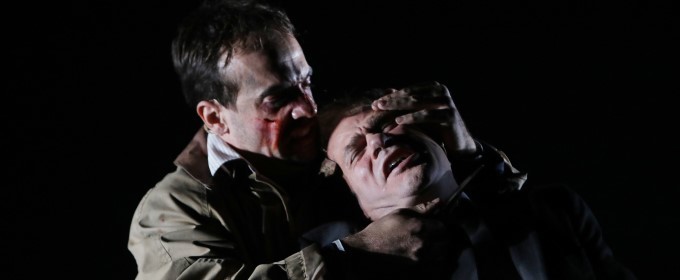Review: OTHELLO at Grand Théâtre

One of the most renowned plays in human history. It is hard to meet someone who has not at least heard of the name Othello and, while it is not an obvious favourite among the Shakespearean classics, it does focus on topics that speak directly to our hearts. No love was as impossible as Romeo and Juliet's and few of us are married to a murderous sociopath who would stop at nothing to be queen. But it does not take an epic medieval reason for the seed of doubt to be firmly rooted in our minds. Othello is perhaps one of the most relatable plays written by the bard, one that touches on the themes of jealousy and that weird feeling of being a stranger in a strange land, no matter how loved and praised you are by those around you.

Luxembourg was, therefore, lucky to host Aurora Fattier's version of this masterpiece. The director managed to created something rather interesting, using a great variety of elements to tell a story we all know, while still giving it a distinct and remarkable uniqueness. The way the tale was told seemed as important as the narrative itself, yet a perfect balance was found between a form and a content that greatly complemented each other. There are many directors working on Shakespeare that get so focused on the style, on creating something new, that they trust too much in the power of the script or the strength of the story. This was entirely not the case, with the introduction of video clips and dream sequences producing a great result.
One cannot entirely say that Fattier's Othello is set in modern days, since it kicks off in the Republic of Venice during an imminent Turkish invasion of Cyprus, but the language, the outfits, the props and the references to jazz and contemporary countries, pretty much bring us to a somewhat anachronistic 20th century. As a matter of fact, the strongest point of this play was the atmosphere it managed to create through a brilliant game of shadows, light and smoke. There were very few moments when it did not feel like you were watching a film noir or an old school thriller, one with a femme fatale or two, and danger waiting behind the corner of a dark alley. Our most sincere congratulations to the production team that made this possible.
Othello was played by William Nadylam. A sad reality of many plays is that the leading role is too instrumental for the plot to possess true depth or display a great deal of character development. Even in the Shakespearean context this can be observed sometimes: Romeo is little more than a one-dimensional imbecile. For this reason, the main actor is often not allowed to be the best member of a given cast. However, I must say that Nadylam was an exception that truly stood out. He did not seem to have the best start during his very first scene, but after his first monologue there was just no stopping him. Monologues were clearly his strongest moments, every single one was delivered with such emotional depth that it was hard not to get immersed in Othello's tragic struggles. While other characters went through a solid development that made them exhibit various emotions, Othello had to display a far greater range. The stages between "a confident man in love" and "broken individual brought down by doubt and guilt" are countless in this play and Nadylam executed them with formidable consistency.
We cannot, however, fail to mention that Koen de Sutter's Iago was an absolute wonder too. While Othello went from one end of the spectrum to another, Sutter's challenge was different. Iago had to convert in a matter of seconds from an innocent and friendly person who stands by the great leaders of the land, to the evil and plotting man behind the curtain. All of this while being a source of comic relief. It is an herculean achievement to be the villain of a tragedy with a film noir atmosphere and still be the guy that makes you laugh.
As for Desdemona, the part felt to Pauline Discry. But under that light, if in the first couple of scenes you had told me her name was Chloë Grace Moretz, I might have believed you. Discry's role was not as open to development as the first two, yet she executed it brilliantly nonetheless. Her voice stood out whenever she spoke, always perfectly placed to deliver just the right impact. Ironically, though, it was through physical expression that she most contributed to the play. Her body language was crucial for the spirit of the narrative, since her notorious beauty was the source of male admiration and, by extension, Othello's jealousy. This contribution was not limited to how comfortable she felt during physical scenes: her facial expressions were also flawless. A lot of what she said seemed to be said in silence, both in moments of joy and misery.

We would only remark that the performance was perhaps a bit too long, with some scenes dragging for longer than required. We fully support the idea that converting a trusting husband into a broken soul poisoned by doubt is a process that requires a visible progress. But when we get to a Ben Hur level, I could understand how some could question this length.
All in all was a great night and we strongly recommend anyone residing in Luxembourg to grab the last tickets and catch the show until the 21st of October.
Image credit: Dominique Houcmant
Reader Reviews
Videos

